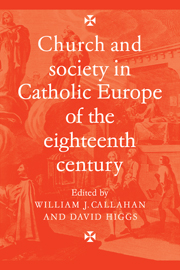Book contents
- Frontmatter
- Contents
- Preface
- Notes on contributors
- 1 Introduction
- 2 The French church
- 3 The Spanish church
- 4 The Portuguese church
- 5 The Italian churches
- 6 The German Reichskirche
- 7 The Austrian church
- 8 The Hungarian church
- 9 The Polish church
- 10 Popular religion in the eighteenth century
- Select bibliography
- Index
4 - The Portuguese church
Published online by Cambridge University Press: 05 November 2011
- Frontmatter
- Contents
- Preface
- Notes on contributors
- 1 Introduction
- 2 The French church
- 3 The Spanish church
- 4 The Portuguese church
- 5 The Italian churches
- 6 The German Reichskirche
- 7 The Austrian church
- 8 The Hungarian church
- 9 The Polish church
- 10 Popular religion in the eighteenth century
- Select bibliography
- Index
Summary
The study of church–state relations and theological controversies has held pride of place in the scant modern investigation of eighteenth-century Catholicism in Portugal. This is true of Fortunato de Almeida's standard work on the history of the Portuguese church since the middle ages, História da Igreja em Portugal, unkindly but accurately described by one eminent critic as ‘dry, external and political’. Alone among historians of this century in the range of his writings on the nature of Portuguese baroque Catholicism, Almeida's work was partisan and attempted no systematic examination of the socio-economic role of the church. During the half-century following the publication of his books little has appeared on the place of the church in the life of the mass of the population, with the notable exception of Jacques Marcadé's study of the poor and sparsely populated Ourique district in the southern Alentejo. In consequence, any discussion of the link between the church and the Portuguese is as much a statement about what remains to be investigated as it is an appraisal of information already amassed by historians.
In the eighteenth century all levels of the Portuguese economy were touched by ecclesiastical wealth deriving from the spending of churches, convents and the revenue raised from land, housing and other investments. A significant amount of this revenue was transferred from clerical ownership into the hands of the laity. Chapel-shrines (capelas) endowed for particular devotions were often supported by buildings or lands held in mortmain by families who enjoyed any excess profits generated by the property after having fulfilled ritual obligations laid on them by the founders.
- Type
- Chapter
- Information
- Publisher: Cambridge University PressPrint publication year: 1979
- 1
- Cited by



